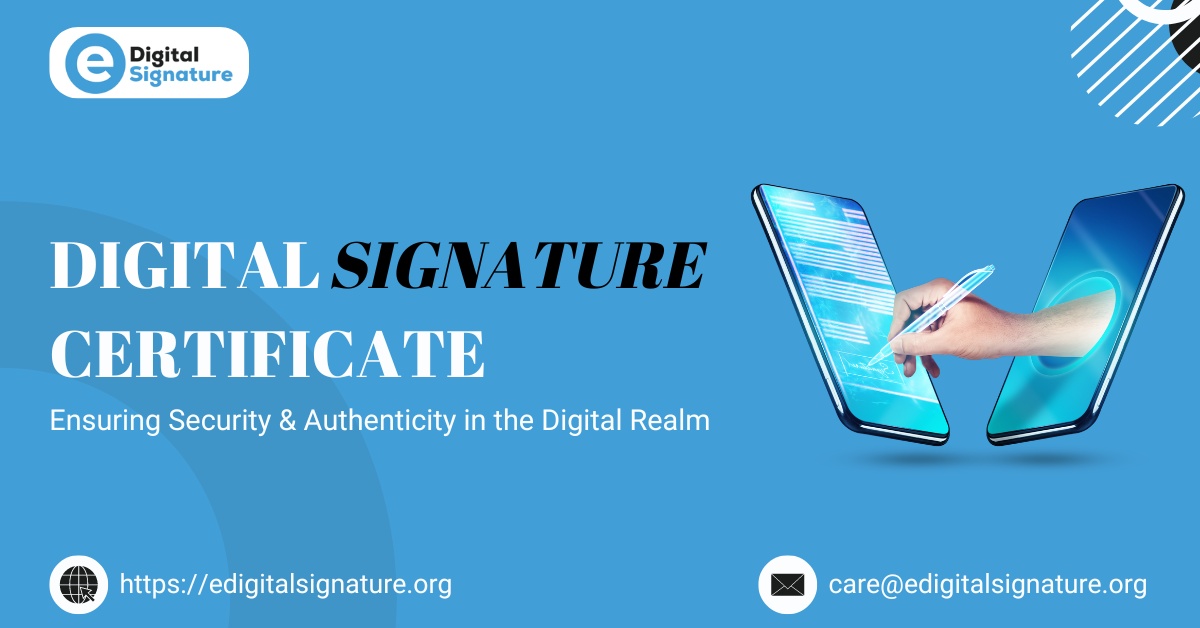Business
Digital Signature Certificates: Ensuring Security & Authenticity in the Digital Realm

A digital signature certificate is a safe digital key that is granted by the certifying body to verify and authenticate the identity of the certificate holder. To produce digital signatures, public key encryptions are used.
An email address, name, pin code, country, date of certificate issue, and the name of the certifying authority are all included in a digital signature certificate (DSC).
A licensed electronic signature service provider issued by the Ministry of Electronics and Information Technology’s Controller of Certifying Authorities, offering digital signature certifications for GST, MCA, Income Tax, tender submissions, and EPFO filings.
Understanding Digital Signature Certificates
A Digital Signature Certificate (DSC) is an electronic document that serves as a digital equivalent of a handwritten signature. It validates the identity of the sender and ensures the integrity of the signed document or message. DSCs use cryptographic techniques to provide security and authenticity to digital communications.
How Digital Signature Certificates Work
At the core of DSCs is asymmetric cryptography, which involves the use of public and private keys. Each user is issued a pair of keys: a public key, which is freely distributed, and a private key, which is kept confidential. When a user signs a document or message, they use their private key to create a unique digital signature. Recipients can verify the signature using the sender’s public key, ensuring that the document has not been tampered with and originated from the purported sender.
Types of Digital Signature Certificates
There are primarily three types of DSCs, each serving different purposes:
Class 1 DSC:
These certificates are issued for individuals and are primarily used for email communication. They validate the user’s email address and provide a basic level of security.
Class 2 DSC:
Suitable for both individuals and organizations, Class 2 DSCs validate the user’s identity against a pre-verified database. They are commonly used for filing tax returns, company filings, and other online transactions.
Class 3 DSC:
Offering the highest level of security, Class 3 DSCs require the physical presence of the applicant during the verification process. They are used for e-tendering, e-procurement, and other high-value transactions that demand stringent security measures.
Documents Required for Registration:
Identification Documents: Depending on the provider and level of digital signature required, you may need to provide official identification documents such as a passport or driver’s license to verify your identity.
Proof of Address: Some providers may also require proof of your residential or business address, such as a utility bill or bank statement, to further verify your identity.
Business Registration Documents: If registering as a business entity, you may need to provide relevant registration documents, such as a certificate of incorporation or business license.
Authorization Letter: In some cases, you may need to provide an authorization letter if signing on behalf of another individual or organization.
HOW TO APPLY FOR A DIGITAL SIGNATURE ONLINE
Step 1: Visit the online portal of E-Digital Signature.
Step 2: Fill in the Details on the DSC application form, provide necessary details such as your name, address, and other relevant information
Step 3: Submit the required documents as proof of identity and address. This may include your PAN card, Aadhaar card, passport, or other valid documents.
Step 4: Pay the applicable fee for the DSC
Step 5: Once your application is successfully verified, the CA will issue your digital signature certificate (in the form of a USB Token), and send you by courier.
Applications of Digital Signature Certificates
DSCs find extensive applications across various sectors and industries:
Legal Documents: DSCs are widely used for signing legal contracts, agreements, and deeds electronically, eliminating the need for physical paperwork and streamlining the process.
Financial Transactions: In the realm of online banking, DSCs play a crucial role in ensuring the security and authenticity of transactions, and safeguarding sensitive financial information.
Government Services: Many government agencies and departments mandate the use of DSCs for online submissions, applications, and filings, enhancing efficiency and transparency.
E-commerce: From online shopping to digital contracts between buyers and sellers, DSCs facilitate secure transactions in the e-commerce ecosystem, fostering trust and confidence among consumers.
Healthcare: In the healthcare sector, DSCs are utilized for maintaining electronic health records (EHRs), prescribing medications digitally, and ensuring the confidentiality and integrity of patient data.
Advantages of Digital Signature Certificates
The adoption of DSCs offers several benefits:
Enhanced Security: DSCs provide a robust layer of security, protecting digital communications from unauthorized access, tampering, and forgery.
Legal Validity: DSCs hold the same legal validity as handwritten signatures, making them legally binding and admissible in courts of law.
Cost and Time Savings: By eliminating the need for paper-based documentation and manual signature verification, DSCs help save time and reduce operational costs.
Global Acceptance: DSCs are recognized and accepted internationally, facilitating cross-border transactions and collaborations with ease.
Environmentally Friendly: The shift towards digital signatures reduces paper consumption, contributing to environmental sustainability efforts.
Also, Read: Digital Signature Certificate for Income Tax
Conclusion
Digital signatures play a crucial role in modern-day business and communication, offering a secure and efficient way to sign electronic documents. By understanding the different types of digital signatures, the registration process, benefits, and required documentation, individuals and organizations can harness the power of digital signatures to streamline operations, enhance security, and drive digital transformation. Embracing digital signatures not only saves time and resources but also fosters trust and confidence in electronic transactions, paving the way for a more seamless and secure digital future.
-

 Business5 months ago
Business5 months agoSepatuindonesia.com | Best Online Store in Indonesia
-

 Technology3 weeks ago
Technology3 weeks agoTop High Paying Affiliate Programs
-

 Tech5 months ago
Tech5 months agoAutomating Your Window Treatments: The Advantages of Auto Blinds
-

 Tech5 months ago
Tech5 months agoUnleash Your Potential: How Mecha Headsets Improve Productivity and Focus
-

 Instagram2 years ago
Instagram2 years agoFree Instagram Follower Without Login
-

 Reviews11 months ago
Reviews11 months agoAndroid Laptop vs. Chromebook: Which one is better?
-

 Instagram2 years ago
Instagram2 years agoIGTOK – Get Instagram Followers, Likes & Comments
-

 Business8 months ago
Business8 months agoFollow These 5 Tips To Avail Personal Loans At Lower Interest Rates




















